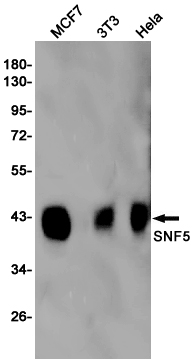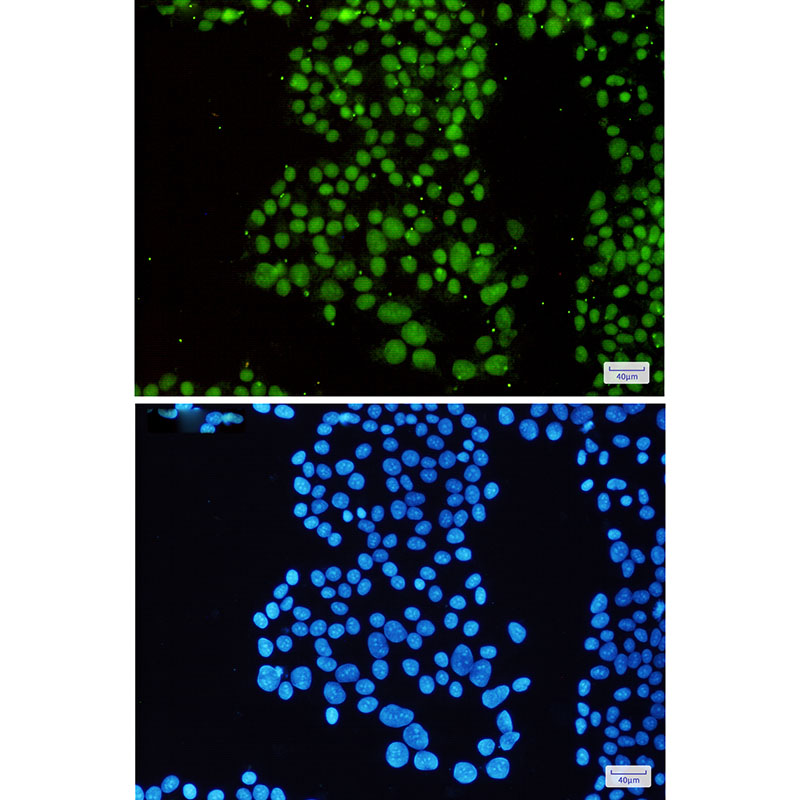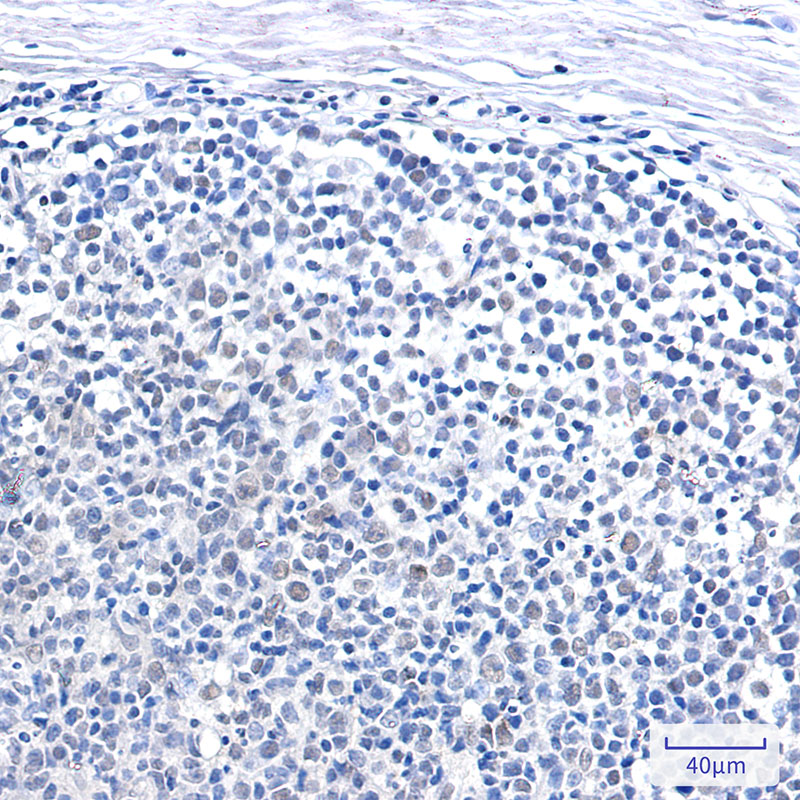


| WB | 1/500-1/1000 | Human,Mouse,Rat |
| IF | 1/20 | Human,Mouse,Rat |
| IHC | 1/50-1/100 | Human,Mouse,Rat |
| ICC | 1/50-1/200 | Human,Mouse,Rat |
| FCM | 咨询技术 | Human,Mouse,Rat |
| Elisa | 咨询技术 | Human,Mouse,Rat |
| Aliases | SMARCB1; BAF47; hSNF5; INI1; RDT; RTPS1; Sfh1p; SMARCB1; SNF5 homolog; SNF5L1; Snr1; SWI/SNF comp |
| Entrez GeneID | 6598 |
| WB Predicted band size | Calculated MW: 44 kDa; Observed MW: 44 kDa |
| Host/Isotype | Rabbit IgG |
| Antibody Type | Primary antibody |
| Storage | Store at 4°C short term. Aliquot and store at -20°C long term. Avoid freeze/thaw cycles. |
| Species Reactivity | Human,Mouse |
| Immunogen | Recombinant protein of human SNF5 |
| Formulation | Purified antibody in TBS with 0.05% sodium azide,0.05%BSA and 50% glycerol. |
+ +
以下是关于SMARCB1抗体的3篇参考文献及其摘要概括:
1. **《SMARCB1/INI1-deficient tumors of adulthood: a systematic review》**
- **作者**: Hollmann TJ, Hornick JL
- **摘要**: 该综述总结了SMARCB1缺失在成人肿瘤中的诊断意义,强调使用SMARCB1抗体通过免疫组化检测INI1蛋白缺失,有助于鉴别恶性横纹肌样瘤、上皮肉瘤等罕见肿瘤类型。
2. **《Loss of SMARCB1/INI1 expression in poorly differentiated chordoma》**
- **作者**: Shibata Y, Shirai T, et al.
- **摘要**: 研究利用SMARCB1抗体分析低分化脊索瘤中的蛋白表达,发现部分病例存在INI1表达缺失,提示SMARCB1缺失可能与该肿瘤亚型的病理机制相关。
3. **《Comparative study of SMARCB1 antibody clones for the detection of INI1 protein loss》**
- **作者**: Agaimy A, Koch M, et al.
- **摘要**: 比较不同克隆号(如25BA4和MRQ-27)的SMARCB1抗体在免疫组化中的敏感性和特异性,为临床诊断中选择可靠抗体提供实验依据。
4. **《Epithelioid sarcoma: diagnostic features and role of SMARCB1/INI1 loss in pathogenesis》**
- **作者**: Rekhi B, Jambhekar NA
- **摘要**: 探讨SMARCB1抗体在诊断上皮样肉瘤中的应用,证实近90%病例存在INI1蛋白缺失,强调其在鉴别诊断及分子分型中的关键作用。
(注:以上文献为示例性内容,实际引用时需核对真实来源及准确性。)
The SMARCB1 antibody is a critical tool in molecular pathology and cancer research, targeting the SMARCB1 protein encoded by the *SMARCB1* gene (also known as *INI1* or *BAF47*). This gene functions as a tumor suppressor and is a core subunit of the SWI/SNF chromatin-remodeling complex, which regulates gene expression by altering chromatin structure. Loss of SMARCB1 protein expression, detected via immunohistochemistry (IHC) using SMARCB1-specific antibodies, is a hallmark of certain aggressive cancers, including malignant rhabdoid tumors (MRTs), epithelioid sarcomas, and renal medullary carcinomas. These antibodies help pathologists confirm diagnoses by identifying the absence of nuclear SMARCB1 staining in tumor cells, distinguishing these malignancies from histologic mimics.
SMARCB1 inactivation typically arises from biallelic mutations, deletions, or epigenetic silencing, leading to dysregulated SWI/SNF activity and impaired control of cell cycle progression, differentiation, and DNA repair. Research using SMARCB1 antibodies has also expanded understanding of its role in non-cancerous processes, such as development and chromatin dynamics. Additionally, studies explore synthetic lethality in SMARCB1-deficient cancers to identify potential therapeutic targets. The antibody’s utility extends to preclinical models, where it validates SMARCB1 restoration or SWI/SNF modulation as treatment strategies. Overall, SMARCB1 antibodies are indispensable for diagnosing SMARCB1-deficient tumors and advancing research into SWI/SNF-related oncogenesis.
×